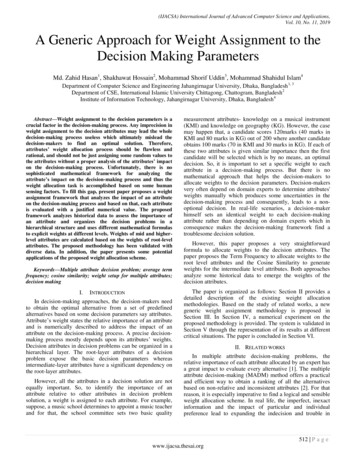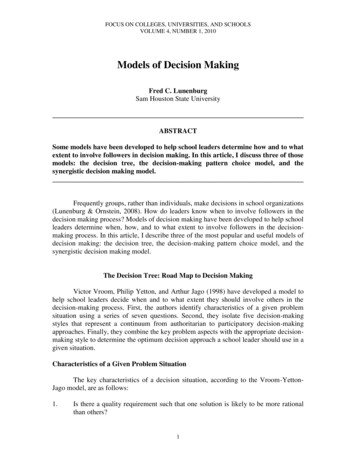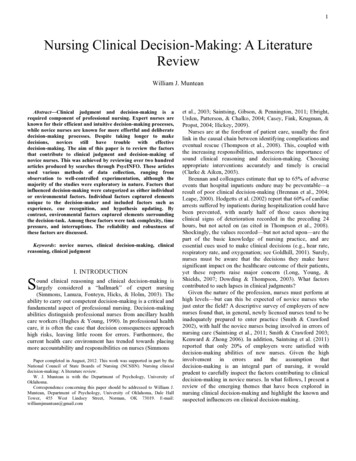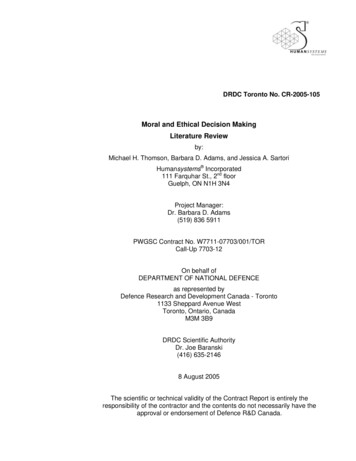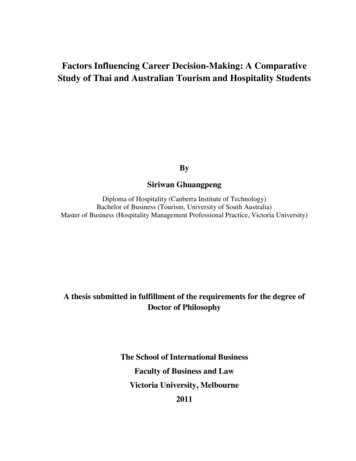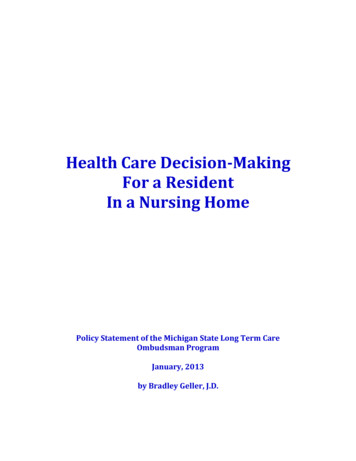
Transcription
Health Care Decision-MakingFor a ResidentIn a Nursing HomePolicy Statement of the Michigan State Long Term CareOmbudsman ProgramJanuary, 2013by Bradley Geller, J.D.
Copyright 2013 by Bradley Geller2
Health Care Decision-Making For a ResidentIn a Nursing HomeTable of ContentsIntroduction5Advance Directives9Family Decision-Making25Guardianship31AppendicesA. Advance Directives Booklet49B. Social Welfare Act Excerpt95C. Michigan Dignified Death Act97D. Mental Health Code Excerpt103E. Rights in the Guardianship Process1053
4
IntroductionThe law has long been clear that an adult who is able to giveinformed consent to medical treatment – who understands her or hiscondition, treatment options, intended effects and possible side effect ofthese choices – has sole right and authority to make those decisions.Residency in a nursing home does not affect this right.The law concerning who has authority to make medical decisions ifan adult lacks the ability to do so has evolved over the years through newlaws and court decisions.The process has been episodic, non-comprehensive, and incomplete.The state of the law today can be compared to a jigsaw puzzle with somepieces missing and other pieces not fitting well with one another.The situation is understandably confusing to long-term careresidents, to family members, to health care providers, to long-term careombudsman and to state officials charged with overseeing the quality ofnursing home care.For a number of years, surveyors cited nursing homes if everyresident did not have either an advance directive or a guardian. However,this was a misinterpretation of the law, with adverse consequences forresidents and for nursing homes.Nursing home staff can be under the misimpression that a patientadvocate has authority immediately upon the signing of an advancedirective, or that a guardianship preempts almost all rights of a resident.Historically, some nursing homes have pushed for guardianship forthe convenience of the nursing home rather than the needs of the residents.It is the aim of this Statement to clarify this broad area of the law,which we term surrogate decision-making.It must be noted the Centers for Medicare and Medicaid Servicespublished changes to surveyor guidance for F-tag 155 (advance directives)5
and F-tag 309 (quality of care – review of resident at or approaching end oflife), effective November 30, 2012.These changes do not alter state law regarding who can make healthdecisions for an individual who becomes unable to make them her orhimself. Indeed, the new language underscores the importance of properlyrecognizing those who are so empowered.The sole focus of these materials is health care decision-making.There are different laws and different mechanisms for decision–makingconcerning an individual’s property and financial affairs.The Policy Statement is in three parts: Advance Directives, FamilyDecision-Making, and Guardianship.Information on voluntary andinvoluntary psychiatric hospitalization is beyond the scope of this paper.For ease of reading, the information is presented in a question-andanswer format. Citations are to Michigan law (MCL); federal statute (42USC) or federal regulation (42CFR).The statement is directed toward nursing home administrators,social workers, directors of nursing, and admissions personnel; and tonursing home surveyors in the Bureau of Health Systems, MichiganDepartment of Licensing and Regulation.The Michigan State Long Term Care Ombudsman Program hasdeveloped other materials on surrogate decision-making for residents oflong term care facilities and their families.These publications include the booklet, Advance Directives:Planning for Medical Care in the Event of Loss of Decision-MakingAbility. The booklet, which has questions-and-answers, and fill-in-theblank forms, is Appendix A to this paper, and has been accessible on-line.In addition to English, the booklet is available in Spanish, Arabic,Chinese, Korean, German and Italian.These materials or others can be used by nursing homes to helpfulfill federally mandated responsibilities to educate staff; to providecommunity education; and to assist willing residents to complete anadvance directive.In reviewing the particulars of the law, it is important to keep inmind the grand purpose of this statutory and regularly scheme concerning6
surrogate decision-making: to honor the wishes, values and dignity of theindividual.It is also important to recognize there can be an unfortunate chasmbetween the law as it is written, and the law as it is practiced.If upon reading this policy paper, you have further questions, pleasecontact the State Long Term Care Ombudsman Program at (517) 373-3697or gellerb@michigan.gov.Finally, I thank Sarah Slocum, Michigan State Long Term CareOmbudsman, for her unflagging advocacy and support.B.G.7
8
Part 1Advance DirectivesWhat is an advance directive?An advance directive is a signed and witnessed document in whichan individual voluntarily provides input or direction concerning futuremedical care decisions in the event the individual become unable toparticipate in these decisions.Are there different types of advance directives?Yes. But to avoid unnecessary confusion, this statement focuses onthe most prevalent type of advance directive, a “durable power of attorneyfor health care.” This type of document is also known as a “health careproxy,” or a “patient advocate designation.”What is a durable power of attorney for health care?A durable power of attorney for health care is a document wherebyan individual voluntarily chooses another person to make medical decisionsfor her or him, during any time she or he “unable to participate in medicaltreatment decisions.” MCL 700.5506 et seq.What is a nursing home’s obligation concerning advance directives fora new resident?Under the Federal Patient Self-Determination Act, a nursing homewhich participates in Medicare or Medicaid must give written informationto a new resident about the resident’s right under Michigan law to make9
decisions about her or his medical care, and the right to sign an advancedirective. 42 USC 1395cc(f)(1)((A)(i); 42 USC 1396a(w)(1)(A)(i); 42CFR489.102(a)(1); 42 CFR 483.10(b)(8).What if an incoming resident does not have the capacity to understandthis information?The nursing home has an obligation to give the information to familyor a surrogate for the resident empowered under state law to receiveinformation about a nursing home’s policies and procedures. 42 CFR489.102(c).Must a nursing home help a resident toward having an advancedirective?Yes. A nursing home has a responsibility “to offer assistance if aresident wishes to execute one or more directive(s).” CMS SurveyorGuidance to F Tag 155, p. 4.During a periodic survey, surveyors must interview staff todetermine “how staff help the resident or legal representative documenttreatment choices and formulate an advance directive.” CMS SurveyorGuidance Investigative Protocol for 42 CFR 483.10(B)(4) and (8).Can a nursing home provide educational materials about advancedirectives to an applicant or resident?Yes.What about making fill-in-the-blanks forms available?A nursing home should instruct a resident about options forcompleting an advance directive, including how to obtain fill-in-the-blanksforms.10
If a nursing home makes available fill-in-the-blank forms, the homeshould ensure residents are aware there is no standard form for a durablepower of attorney for health care, and that the resident has other options.Can a nursing home require an applicant or a resident to have anadvance directive?No. It is an individual’s a choice whether to have an advancedirective. A nursing home cannot condition admission or continued stay ona resident having or not having an advance directive.42 USC1395cc(f)(1)(C); 42 USC 1996a(w)(1)(C); 42 CFR 489.102(a)(3).This is echoed in state law. MCL 700.5512(2)How does a nursing home know if an incoming resident already has anadvance directive?The nursing home must determine whether an incoming residentwhether she or he has an advance directive. The nursing home should askthe resident, or if the resident is unable to understand, should ask family orother surrogate.What is the obligation of the nursing home if an incoming residentalready has an advance directive?The nursing home has an obligation to make an advance directive aprominent part of the resident’s medical record. 42 USC 1395cc(f)(1)(B);42 USC 1396a(w)(1)(B). 42 CFR 489.102(a)(2).This is true for a new resident or a long-term resident.Can a nursing home require an incoming resident to complete a newadvance directive?No. A nursing home cannot require a resident to replace an advancedirective with one written on the nursing home’s own form. The nursing11
home must make the existing advance directive part of the resident’smedical record. Any corporate policy to the contrary is invalid.Is there a statewide site where a durable power of health care can befiled?Yes. Through legislation passed in 2012, The Michigan Departmentof Community Health is contracting with Gift of Life of Michigan, an organdonation agency, to establish a statewide registry for durable powers ofattorney for health care. MCL 333.10301.Participation is voluntary on the part of the individual, and it is free.Nursing homes will have electronic access to this information at no cost.When will the registry be in operation?The registry, known as Peace of Mind, will be open to registrants bymid-2013, and to providers in 2014.Can an individual also include in a durable power of attorney forhealth care wishes concerning future medical treatment?Yes, an individual has a choice whether to include general wishes,specific wishes or no wishes at all. MCL 700.5507(1).Who is able to have a durable power of attorney?An individual must be 18 years old or older, and of “sound mind.”MCL 700.5506. In this context, sound mind means the individual realizeshe is giving another person authority to make health care decisions if she orhe cannot, and she or he knowingly chooses this person.12
Is there a standard form for a durable power of attorney for healthcare?No. There are a number of forms available from differentorganizations.An individual can instead have a lawyer draft thedocument. A hand-written document can be valid if properly signed andwitnessed.What are the requirements of a valid durable power of attorney forhealthcare?The document must be signed by the individual, and witnessed bytwo persons. Nursing home staff members are prohibited from serving as awitness for a resident. MCL 700.5506(4).Does the document have to be notarized?No. There is neither a requirement nor suggestion in the law that thedocument be notarized.What is the person designated in a durable power of attorney forhealth care called?The person is called a “patient advocate.” MCL 700.5506(2).Can an individual choose more than one patient advocate to serve atthe same time?No. Under this statute, an individual can only choose one person toserve at any one time.13
Can an individual name a second person to serve if the first personcannot?Yes. An individual can appoint one person as patient advocate, anda second person to serve as patient advocate if the first person does notaccept, is incapacitated, resigns or is removed. MCL 700.5507(2).The second person is commonly known as a “successor patientadvocate.”A patient advocate or successor patient advocate does not havepower to delegate her of his powers to someone not named in thedocument.What if an individual does choose two or more patient advocates toserve at the same time?The document is not invalid. You may request the designated patientadvocates inform you who will serve as the primary contact person.Does a patient advocate have authority to make decisionsimmediately upon the individual signing the durable power ofattorney?No. This is misconception as serious as it is popular.Upon signing a durable power of attorney for health care, theindividual retains the right to make medical care decisions for herself orhimself just as before.One criteria for compliance with 42 CFR 483.10(b)(4) and (8) is if thefacility has “documented when the resident is determined not to havedecision-making capacity and therefore decision-making is transferred tothe health care agent or legal representative.” CMS Surveyors Guidance.(emphasis added)14
Can an individual give a patient advocate immediate access to medicalrecords?Yes. Indeed, the document might explicitly reference HIPPA, andserve as a release under that statute.What must occur before a patient advocate has authority to act for theindividual?First, the patient advocate must be given a copy of the document.Second, the patient advocate must sign an “acceptance,” a documentwhereby the person agrees to properly undertake her or his duties. MCL700.5507(3).Is there standard language for the acceptance?The general language of the acceptance is set forth in law. MCL700.5507(4).When does the patient advocate have to sign the acceptance?The patient advocate can sign the acceptance when the individualsigns the durable power of attorney for health care, or at any timethereafter.What else must occur before a patient advocate has authority to act?A patient advocate only has authority to act when the individual is“unable to participate in medical treatment decisions.” MCL 700.5508(1).Who determines whether the individual has become unable toparticipate in medical treatment decisions?The individual’s attending physician and a second physician orlicensed psychologist make that determination. MCL 700.5508(1).15
Must the attending physician and the other physician or psychologistexamine the individual before making the determination?Yes. MCL 700.5508(1). They need not conduct the examination atthe same time as one another.What must the physicians or psychologist do upon making theirdetermination?The physicians or psychologist must put their determination inwriting, make the writing part of the resident’s medical record, and reviewthe determination at least once a year. MCL 700.5508(1).How is a durable power of attorney described after the physicians orphysician and psychologist have made their determination?If the individual is deemed unable to participate in medical treatmentdecisions, a popular expression is that the durable power of attorney forhealth care has been “triggered.”Is there a standard form for the physicians or psychologist to use?No. It is up to the nursing home to develop a form for this purpose.Are the two physicians or physician and psychologist determining theindividual is incompetent?No. Only a court, after notice and a hearing, can determine anindividual is “incapacitated” in a legal sense. MCL 700.1105(a); MCL700.5306(1)16
What powers can an individual give her or his patient advocate?An individual can give a patent advocate the power to make any care,custody and medical decisions the individual herself or himself could make.Can an individual give a patient advocate power to withhold orwithdraw life-sustaining care?Yes. To do so, the individual must explicitly state in the documentthat she or he is giving the patient advocate that power.MCL700.5509(1)(e).What treatments could a patient advocate withhold or withdraw ifgiven this authority?Examples include resuscitation, antibiotics, respirator care and tubefeeding. A patient advocate could also opt for hospice care. MCL5509(1)(f).Can a patient advocate determine which relatives can visit a residentor talk with a resident by telephone?No. A resident has the right to speak on the telephone and to havevisitors of his or her choice.What is the duty of the patient advocate?A patient advocate has a duty to take reasonable steps to follow thedesires and instructions of the individual, whether expressed in thedocument or orally in the past. MCL 700.5509(b).What if the first patient advocate cannot be found?The health care provider can call upon the successor patientadvocate.17
What happens if an individual regains the ability to participate inmedical treatment decisions?If an individual regains the ability to participate in medical treatmentdecisions, the authority of the patient advocate is suspended for as long asthe individual remains able to participate. MCL 700. 5509(2).Who determines an individual has regained the ability to participatein medical treatment decisions?The law is silent on this issue. One might assume the attendingphysician can make this determination.What happens if the individual again loses the ability to participate inmedical treatment decisions?The determination an individual has once again become unable toparticipate in medical treatment must be made by two physicians or aphysician and psychologist. MCL 700.5509(2)Is there any time limit after which a durable power of attorney is notvalid?No. The only exception is if the document, itself, states a time limit.How often must the physicians or physician and psychologist reviewtheir determination?If the individual has been determined to be unable to participate intreatment decisions, the attending physician and second physician orpsychologist are to review the determination at least once a year. MCL700.5508(1).Can an individual revoke a durable power of attorney for health care?Yes.18
Does a revocation need to be in writing?No.Can an individual revoke a designation even after two physicians havedetermined that she or he is unable to participate in treatmentdecisions?Yes.The law reads, “ even if the individual is unable to participate inmedical treatment decisions, a patient may revoke a patient advocatedesignation at any time and in any manner by which he or she is able tocommunicate an intent to revoke” it. MCL 700.5510Can an individual partially revoke a durable power of attorney forhealth care?In effect, yes. Even if an individual is unable to participate in medicaltreatment decisions, she or he can express a desire to receive specific life extending procedures, and those wishes are binding on the patientadvocate. MCL 700.5511(1)What is a nursing home’s obligation if a resident revokes a durablepower of attorney for health care?If a nursing home administrator or staff member witnesses arevocation that is not in writing, that person must describe thecircumstances in writing, and sign it. MCL 700.5510(1)(d).The nursing home or physician must then note the revocation in theresident’s medical records and bedside chart, and attempt to contact thepatient advocate. MCL 700.5501(1)(d).19
Can a resident sign a new durable power of attorney after revokingone?Yes, if the resident is of “sound mind.”An individual might be unable to participate in treatment decisions,but still be able to understand giving another person authority to makethose decisions.What if a resident has more than one document?The most recent, validly signed document should be followed if thereis any inconsistently between the two documents. MCL 700.5510(1)(e).Does a patient advocate have any authority after the death of theindividual?Yes, but only to the extent the durable power of attorney for healthcare empowers the patient advocate to make an organ or body donation.MCL 700.5510(1)(d).What if dispute arises concerning a durable power of attorney forhealth care?The following disputes can be resolved through petition to theprobate court:1) Whether or not an individual is able to participate in medicaltreatment decisions. MCL 700.5508(2).2) Whether or not an individual has revoked a durable power ofattorney for health care. MCL 700.5510(1)(d)3) Whether or not the patient advocate is acting consistent with theindividual’s wishes and otherwise consistent with the individual’sbest interests. MCL 700.5511(5).20
Does a nursing home have an obligation to honor a durable power ofattorney for health care?Yes.If a durable power of attorney for health care is properly signed andwitnessed, if a proper determination has been made the resident is unableto participate in medical treatment decisions, if the patient advocate isacting in the resident’s best interest, and if the directions of the patientadvocate are within sound medical practice, a nursing home is obligated tofollow those directions. MCL 700.5511(3).How will a surveyor evaluate compliance with this obligation?When a surveyor does a record review, he or she must determine“whether any treatments or interventions have been ordered (e.g.,unplanned hospitalizations or placement of a feeding tube) that areinconsistent with the resident’s documented acceptance or refusal oftreatment or with any advance directive.” CMS Guidance to Surveyors.To comply with 42 CFR 483.10(b)(4) and (8), the facility must have“monitored the care and services given to the resident to ensure they areconsistent with the resident’s documented choices and goals.” CMSGuidance to Surveyors.Can a nursing home or a physician be successfully sued for followingthe instructions of a patient advocate?If a health care provider reasonably believes the patient advocate hasauthority to make a decision, the health care provider has the same liabilityas if the individual had made the decision herself or himself. MCL700.5511(2).What else does law require of nursing homes?A nursing home has an obligation to provide for “education of staffand the community on issues concerning advance directives.” 42 USC1395cc(f)(1)(E); 42 USC 1396a(w)(1)(E).21
Can the State Long Term Ombudsman Program assist nursing homesin training nursing home staff?Yes. The SLTCOP will consider requests to provide writtenmaterials, to participate in in-service training, and to address larger groupsat conferences.Are there advance directives other than a durable power of attorneyfor health care?Yes. One type is a “living will.” In a living will, an individual statesher or his wishes for care if terminally ill and not able to participate intreatment decisions.Although 47 states have laws making living wills legally binding,Michigan does not have such a law.Can an individual still have a living will?Yes. The document can provide good evidence of the wishes of anindividual. This may be particularly important for an individual who hasoutlived closed friends and relatives, and has no one to appoint as a patientadvocate.What is an “advance directive for mental health care?”An individual can sign a durable power of attorney for health carethat is limited to mental health treatment decisions. There are provisionsin the law that are different for this type of advance directive.What these differences?In an advance directive for mental health care, the determination ofinability to participate in mental health decisions must be made by aphysician and a mental health professional. MCL 700.5515(2). Theindividual can choose the physician or mental health professional, or both.22
The individual can provide for a 30-day “cooling-off” period,whereby the patient advocate retains authority to make decisions for 30days after a revocation. MCL 700.5515(d).A mental health professional need not comply with a provision of thedocument if the life of the individual or another person is in danger. MCL700.5511(4)(e).Are there other differences?An individual may wish to be quite specific in her or his mentalhealth advance directive. She or he might specify the hospital to which sheor he wants to go, indicate a choice of treating psychiatrist, and list effectivemedications and dosage.Can an individual include wishes for mental health care within a moregeneral durable power of attorney for health care?Yes, if the individual so chooses.Can individual have both a mental health advance directive and ageneral durable power of attorney for health care?Yes. The individual can choose one person to be patient advocate formental health issues and a different person to be patient advocate for allother medical decisions.Where can someone obtain further information?A booklet entitled, Advance Directive For Mental Health Care, withquestions-and-answers and a fill-in-the-blanks forms is available online inEnglish, Spanish and 2941 4868 41752--,00.html23
What is a “do-not-resuscitation declaration?”An individual can sign a standard form stating that if breathing andheartbeat stop, she or he wants no efforts made at resuscitation.This document is intended for individuals living at home or assistedliving. It is not applicable to individuals while in a nursing home orhospital.Is a do-not-resuscitate declaration the same as a “do-not-resuscitateorder?”No. A do-not-resuscitate order is a notation in the medical chart of anursing home resident or hospital patient.The notation is made by a physician at the request of a resident, ahospital patient, a patient advocate (if the patient advocate has been givenauthority to withhold life-sustaining treatment), or other person with legalauthority.24
Part 2Family Decision-MakingWhat is a general family consent law?A general family consent law provides that if an individual is not ableto participate in a medical treatment decisions, and does not have a patientadvocate or guardian, a family member can make the decision for theindividual.Which family member can make the decision?A general family consent statute sets forth a priority for familymembers; first, the spouse; second an adult child or children; third, parents;fourth, siblings.Does Michigan have a general family consent statute?No, Michigan, is not among the states that have such a law.Has a general family consent statute been considered by the Michiganlegislature?Yes. The first time was in 1992, House Bill 5553, introduced by Rep.Perry Bullard and 20 co-sponsors.A revised version was introduced in 1997 as Senate Bill 671. SenatorChris Dingell and five co-sponsors introduced the bill. Neither bill becamelaw.25
Will a general family consent statute be re-considered by the Michiganlegislature?It is possible a bill will be introduced at some point in the future.Nursing homes and other health care providers would have opportunity tocomment on the bill as it was being considered in the legislative process.Are there any laws in Michigan that empower family membersto make medical treatment decisions?Not all providers and advocates agree on an answer to that question.The position of the State Long Term Care Ombudsman Program is there aretwo relevant laws.What is the first law?The Michigan Social Welfare Act provides, in part,If the person for whom surgical or medical treatment isrecommended is not of sound mind, or is not in a condition to makedecisions for himself, the written consent of such person’s nearestrelative, or legally appointed guardian, or person standing in locoparentis, shall be secured before such medical or surgical treatmentis given. MCL 400.66h (The entire section of the law is Appendix B.)How is this law relevant?Michigan’s Medicaid provisions are set forth in the Social WelfareAct. The provision cited above thus applies to nursing home residents andothers enrolled in Medicaid, we believe.Which family member has priority under this statute?The term “nearest relative” is not defined.26
Does the power to consent to treatment for a resident mean a familymember can refuse treatment?Certainly, the family member has the right to withhold consent.If the nursing home believes the family member is not acting in thebest interests of the resident, the nursing home can petition the probatecourt for appointment of a guardian.How does the nursing home determine an individual is not of soundmind or not in a condition to make decisions?The statute provides no guidance.A mini-mental exam is wholly inadequate. And the test is notwhether the resident agrees with the physician or family.What, then is best?The best approach may be to rely on the opinion of the attendingphysician and one other physician or psychologist, who would documenttheir determination in the resident’s medical record. This parallels thedetermination under a durable power of attorney for health care.It is critically important that a nursing home not turn to a familymember if the resident is still able to participate in the treatment decision.What is the second law?The Michigan Dignified Death Act, MCL 333.5652 et seq., sets forthcertain responsibilities for a physician who diagnoses an individual asterminally ill.When did the law go into effect?The law went into effect in1997. The entire Act is Appendix C.27
What is a major responsibility of the physician under the law?If the physician is recommending treatment, the physician mustprovide information to the patient on the recommended course oftreatment and alternatives to that treatment. MCL 333.5654.What other information must the physician provide?If the physician is recommending treatment, the physician mustprovide information to the patient that she or he has the right to o Make “an informed decision regarding receiving, continuing,discontinuing, and refusing medical treatment”o Choose palliative care, including hospice careo Choose “adequate and appropriate pain and symptom management.”MCL 333.5655.What if the patient is unable to give consent?The law provides that the same information described above beprovided to the patient’s patient advocate or the patient surrogate.What is a patient advocate?A patient advocate is a person appointed by an individual to makemedical decisions if the individual cannot participate. The appointment ismade through a durable power of attorney for health care. MCL 700.5506 etseq.How does this law define patient surrogate?For an adult, a ”patient surrogate means a member of theimmediate family, the next of kin, or the legal guardian. MCL 333.5653(g).28
Can an immediate family member or next of kin can make decisions toconsent to, refuse authorization for, or withdraw medical treatment?There is certainly implication in this law that if an individual is
The nursing home has an obligation to give the information to family or a surrogate for the resident empowered under state law to receive information about a nursing home's policies and procedures. 42 CFR 489.102(c). Must a nursing home help a resident toward having an advance directive? Yes. A nursing home has a responsibility "to offer .







